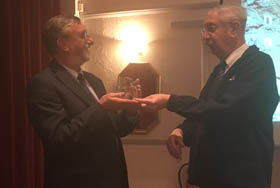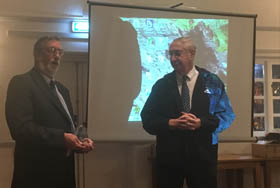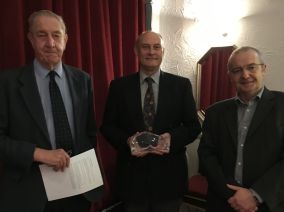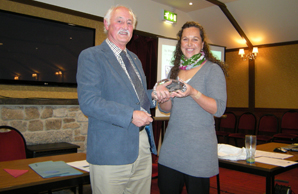Award 2018
Dr Jenny Bennett was the the recipient of the 2018 Award
Growing up in Devon, Jenny went to school in Totnes and Exeter, before training in librarianship at Aberystwyth. She was to spend the next 27 years working in public libraries in Buckinghamshire, Sussex and Hertfordshire. Recognising that a degree would improve her career prospects, she enrolled at the Open University, hoping to study botany. It didn’t take long to realise that she was more attracted to rocks than to plants and reoriented studies accordingly.
The need to widen her experience of rocks in the field led her to look for additional opportunities and the Open University Geological Society (OUGS) was a wonderful source of field trips and lectures. Jenny became a member of the National Committee of the OUGS, and Branch Organiser of the Walton Hall Branch. Joining the Geologists’ Association (GA) also gave access to field trips around the UK and abroad and she served on GA Council in the 1990's. Whilst living in Brighton she met Rory Mortimore at the Civil Engineering Department of Brighton Polytechnic and he allowed her to take part in the department’s mapping trips.
Jenny has maintained links with the Open University, working as an Earth Sciences Tutor and Associate Lecturer for over twenty years (the last fifteen of which were here in the south-west) teaching a range of modules and Summer Schools from first year undergraduate to Masters’ levels.
Voluntary redundancy from local government enabled her to take a Masters degree in Quaternary Science at Cambridge, supervised by Professor Phil Gibbard. That in turn fostered an interest in river terraces and fluvial geomorphology, and after returning to Devon in 2001, she completed a PhD at Exeter University on the ‘Evolution of the River Exe during the Holocene’ supervised by Professor Tony Brown. This was followed by three years as a teaching fellow at Exeter, and several papers on the Exe valley.
Jenny has long been involved in promoting and teaching geology in the south west – leading field trips for many different organisations and co-organising conferences for the Devonshire Association, the Geologists’ Association, the OUGS and the Ussher Society.
She was Secretary of the Devon RIGS group, a committee member for SWRG, currently Secretary of the Devonshire Association, Geology Section and has just completed a term as the first female Chair of the Ussher Society. She is still looking at rivers and their behaviour, most recently using archaeological material and maps to reconstruct the past and maybe, predict the future.
Award 2016
 Richard Hocking was the recipient of the 2016 Frederick Sherrell Career Recognition Award
Richard Hocking was the recipient of the 2016 Frederick Sherrell Career Recognition Award
Richard is currently employed by CORMAC Solutions Ltd, as Soils & Materials Engineer; he manages the Engineering Services Laboratory, part of the CORMAC Consultancy Division. A Chartered Geologist, he graduated from Portsmouth Polytechnic in 1982 with an Honours Degree in Geology and subsequently studied for a Masters Degree in Mining Engineering from Exeter University (Camborne School of Mines) in 1993.
Since graduating he has worked for CORMAC and formerly Cornwall Council and County Council within the Laboratory for over 33 years. His expertise covers a wide range of services to both internal and external clients that include construction materials, asbestos, radon, contaminated land and geotechnical investigation & design.
 He currently sits on the BSI Committee B/526 ‘Geotechnics’ and was specifically responsible for co-drafting BS 6031:2009 ‘Code of Practice for Earthworks’.
He currently sits on the BSI Committee B/526 ‘Geotechnics’ and was specifically responsible for co-drafting BS 6031:2009 ‘Code of Practice for Earthworks’.
Richard is a past chairman of the SW Group of the Institution of Geologists and subsequently The Geological Society; in post during their reunification in 1991. His period of chairmanship also saw the introduction of the annual ProGeo conference.
After the presentation, Richard gave a fascinating insight into his work in the south-west and the many projects for which he has been responsible.
Award 2015
Professor James (‘Jim’) Griffiths was the recipient of the 2015 Frederick Sherrell Career Recognition Award.

Professor James (‘Jim’) Griffiths is one of the leading engineering geomorphologists in the British Isles. This was recognised in 2014 with the accolade of the Glossop Award – the highest level of recognition from the Engineering Geology Group within the Geological Society of London.
Jim began as a Geography school teacher, before studying engineering geomorphology under Denys Brunsden at London University. He worked for a number of consultancies before being appointed as a Lecturer in Engineering Geology at Polytechnic South-West (now Plymouth University). He has worked alongside many of the senior figures in the subject (Peter Fookes, Denys Brunsden, John Hutchinson, Gareth Hearn, Mike Sanders, John Charman, etc.) and commands respect from many in the subject.
He has studied landslides all over the world, especially in Southern Spain where he led field excursions for university students for many years. In Plymouth University he rose to become Head of School and then moved into Senior Management in the Enterprise Section of the University. He retired from the university in summer 2015, though still remains in contact with many of his former colleagues.
As Frederick Sherrell was an eminent, locally-based, engineering geologist, this Career Recognition Award is most appropriate.
Award 2013
John Grimes was the recipient of the 2013 Frederick Sherrell Career Recognition Award. 
John’s early career was as a structural engineer but after completing a Masters degree in geotechnical engineering and a PhD course of study into the ‘Engineering geology and stability of the rapidly alternating limestone and mudrock sea cliffs of Glamorgan’, John’s career path led to substantial involvement in engineering geology and geotechnical engineering in the South West.
In the 1990’s, the sudden and dramatic collapse of land over mine workings in Gunnislake, Cornwall generated both local and national interest and concern. John investigated the problem and engineered a solution which both stabilised the ground, improved minewater drainage and provided risk mitigation against further collapse and drainage deterioration.
 John has engineered many ground stabilisation retention and improvement schemes and is particularly pleased to have been involved with ground stabilisation and jetty construction on Lundy Island. Various ground engineering schemes he has been involved in have been the recipient of ICE awards including The Eden Project, the outer harbour wall at Padstow, the regeneration of Bude Canal and stabilisation of the road and access across coastal slopes and the backshore at Lundy Island.
John has engineered many ground stabilisation retention and improvement schemes and is particularly pleased to have been involved with ground stabilisation and jetty construction on Lundy Island. Various ground engineering schemes he has been involved in have been the recipient of ICE awards including The Eden Project, the outer harbour wall at Padstow, the regeneration of Bude Canal and stabilisation of the road and access across coastal slopes and the backshore at Lundy Island.
Award 2012
This year the Frederick Sherrell Career Recognition Award was awarded to Professor Peter Scott of Peter W. Scott Ltd. and Camborne School of Mines, University of Exeter.
Peter Scott's research and consultancy experiences are in the geology of Earth Resources, particularly Industrial Minerals, including construction materials, and some metalliferous ores. These are complemented by interests in applied mineralogy and petrology, and associated analytical techniques. He has geological fieldwork experience in the UK and internationally.
Peter gave a fascinating talk on the topic - “Is mineralogy important? An applied geologist’s perspective”.
 Award 2011
Award 2011
In 2011, the Frederick Sherrell Career Recognition Award was awarded to Dr Deryck Laming PhD (London) DIC FGS CGeol
The presentation of the Frederick Sherrell Award for Career Recognition this year took place at the regional group AGM. We were delighted that the recipient was Deryck Laming an independent consultant with over 60 years of experience in the region. Deryck completed his PhD on “Sedimentary processes in the formation of the New Red Sandstone of south Devonshire” in 1954, conducting his research under the supervision of Doug Shearman at Imperial College. Alongside his subsequent work with industry he has made a significant contribution to our understanding of the geology of our region, especially the “red beds”. He is also co-editor of the successful book “The Geology of Devon”. Deryck gave a very enjoyable talk after the presentation of the award.
"At the AGM of the South West Regional Group of the Geological Society on 16th November, I was privileged to be presented with the 2011 Frederick Sherrell Award – really a Lifetime Achievement Award – because, as my friend and colleague David Roche said in his introduction, I had been professionally involved with geology in South West England over a span of 60 years (no, not really! – it was only 59.3 years).
At the request of the Chairman, Mark Anderson, I gave a short talk about what I had been doing geologically in the region for those years, which focussed particularly on long-term studies of the Permo-Triassic New Red Sandstone, unravelling the desert sedimentology wrapped up in the fine cliffs and sparse inland exposures from Tor Bay to Budleigh Salterton to Watchet and, recently, applying my knowledge to the task of helping drive a gas-pipeline tunnel beneath the River Exe north of Exmouth. I also gave an account of the shoreline management studies undertaken in Cornwall (all that scenery – what a dreadful task!) and estuarine studies on the Exe, Taw-Torridge, Camel and Hayle estuaries, in some cases continued for up to 20 years monitoring. Aerial photographs are important for such work, and study of these taught me how to “read” a low-tide estuary situation to evaluate how it worked as a sedimentary system. One of my earlier assignments was to find a source of suitable stone for restoration of Exeter Cathedral, which must rank as one of my most interesting tasks, because we uncovered a medieval quarry in Upper Greensand.
I hardly had time to mention my overseas work, but I told of a few amusing incidents on dam sites (and the less amusing one where our drilling rigs one night were strafed with machine-gun fire), and events in Bangladesh (a revolution, large cyclone disaster), Indonesia, India, Iran, Botswana . . . And petroleum work in Canada, and for a Caribbean country where I advised on setting up an offshore licensing regime, even though I thought there was no oil there (regrettably, so far I have not been proved wrong on this one).
Summing up, I emphasised how interesting as a consultant at home and abroad, seeing the more undeveloped parts of the world in places the tourists never visit, solving (or trying to solve) many geological problems, and the great satisfaction derived from getting it right.
Deryck Laming"
Award 2010

At the 2010 AGM of the South West Regional Group the Frederick Sherrell Award for Career Recognition was presented to Dr. Brian Leveridge, formerly of the British Geological Survey (Exeter Office). Brian then gave a very interesting and well illustrated reflection on his 30 years of work in the SW Region. He highlighted the vital role of detailed and extensive geological mapping and field studies in constraining tectonic models, using his own published models for Variscan tectonics as examples.
Award 2009
Professor Malcolm Hart of the University of Plymouth, was presented with the Frederick Sherrell Career Recognition Award in 2009. This award is given to individuals who have made both a contribution to the understanding of the geology of SW England and the promotion of geology in the community.
Previous winners of the Frederick Sherrell Career Recognition Award
2008 - John Harris
2007 - Ted Freshney
2006 - Richard Scrivener
2005 - Clive Nicholas
2004 - Brian Selwood
2003 - Bill Dearman
2002 - Colin Bristow
2001 - Fred Sherrell